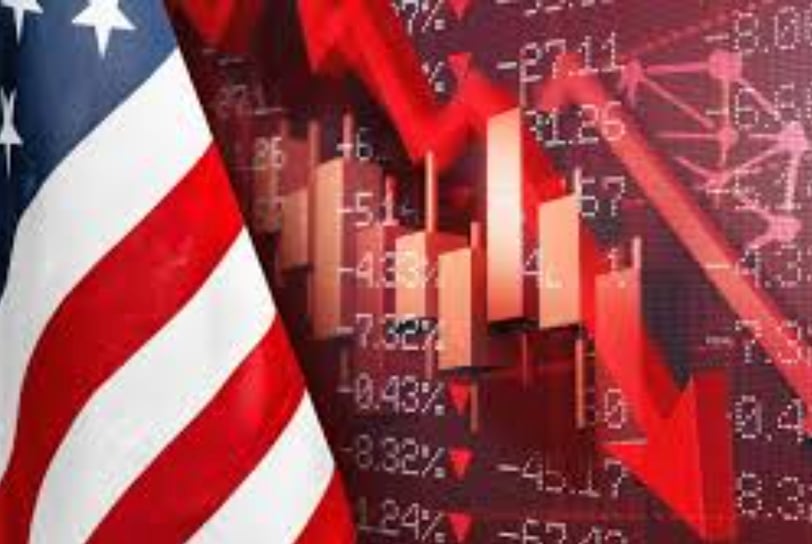Navigating Choppy Waters: Global Economic Headwinds and Their Impact on the US Market (2025)
6/9/20253 min read


Navigating Choppy Waters: Global Economic Headwinds and Their Impact on the US Market (2025)
Introduction:
The global economic landscape is looking a bit turbulent. Recent reports paint a picture of slowing growth, persistent trade tensions, and inflationary pressures, creating uncertainty for investors worldwide. But what does this all mean for the US market? Let's dive into the details and explore the potential implications.
Key Findings from Global Economic Reports (June 2025):
Global Growth Slowdown: The OECD has revised its global growth forecast downwards to 2.9% for both 2025 and 2026. This is largely attributed to the ongoing trade disputes, specifically those involving the US.
Lingering Trade Tensions: Even with some agreements in place, uncertainty surrounding US trade policy remains a significant drag on global investment and economic activity. The US-China trade relationship, while improved, still has lingering tariffs and uncertainty.
Sticky Inflation: Despite a decline in commodity prices, many OECD countries are experiencing persistent inflation due to elevated services prices and higher trade costs.
Divergent Regional Growth: Emerging markets are facing increased financial strain from high global interest rates and a strong US dollar, limiting their ability to stimulate economic growth.
Weakening Investment: Businesses are hesitant to invest due to policy uncertainty and tighter financial conditions. This is especially true for companies that rely heavily on international trade.
The Ripple Effect: Implications for the US Market
These global trends have direct consequences for the US economy. Here's a breakdown:
Tariff Troubles: Even reduced tariffs continue to negatively impact US economic growth and contribute to higher inflation. Economists at Charles Schwab predict this will lead to a decline in GDP growth and a rise in consumer prices.
Policy Paralysis: Economic policy uncertainty in the US is at a high, creating significant downside risks. This uncertainty discourages businesses from investing and hiring, hindering economic expansion.
Stock Market Volatility: Concerns about slowing economic growth and the potential for a recession are fueling volatility in the US stock market. Investors are becoming more risk-averse.
Sector-Specific Pain: Trade-dependent sectors, such as technology and manufacturing, are particularly vulnerable to the negative effects of trade tensions and increased import costs. This could lead to job losses and reduced profits in these industries.
Recession Risk: The combination of slowing growth, persistent inflation, and elevated policy uncertainty raises real concerns about the possibility of a recession in the US economy. While not a certainty, it's a risk that investors need to be aware of.
Navigating the Uncertainty: Recommendations for Investors
So, what should investors do in this environment? Here are some key recommendations:
Exercise Caution: Given the current economic uncertainty, it's crucial to remain cautious and prepared for potential market volatility. Avoid making rash decisions based on short-term market fluctuations.
Diversify, Diversify, Diversify: Diversifying your portfolio across different asset classes (stocks, bonds, real estate, commodities) and geographic regions can help mitigate the risks associated with a potential economic slowdown.
Value Stocks Might be the Key: In the current market environment, value stocks (stocks that are trading at a low price relative to their fundamentals) may offer a more attractive investment opportunity than growth stocks (stocks that are expected to grow at a high rate), as there are a lot of overvalued stocks in the market.
Think Long-Term: Focus on long-term investment strategies and avoid getting caught up in short-term market noise. Remember that investing is a marathon, not a sprint.
Conclusion: Staying Informed and Prepared
The global economic picture presents challenges for the US market. Trade tensions, policy uncertainty, and slowing growth are all factors that investors need to consider. By staying informed, diversifying their portfolios, and focusing on long-term strategies, investors can navigate these choppy waters and position themselves for success.
Food for Thought: Questions to Consider
How will the upcoming elections impact US economic policy and trade relations?
What are the biggest risks and opportunities for specific sectors of the US economy in the current environment?
How can individuals and businesses prepare for a potential recession?
Explore deep insights on current events and growth.
Vision
Truth
hello@insightoutvision.com
+1-2236036419
© 2025. All rights reserved.
